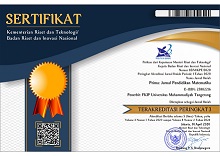Analysis of Mathematic Critical Thinking Abilities of 4th Class Primary School Students on Fraction Material as well as Gender Differences
Abstract
Keywords
Full Text:
PDFReferences
Abdullah, I. H. (2016). BERPIKIR KRITIS MATEMATIK. Delta-Pi: Jurnal Matematika Dan Pendidikan Matematika, 2(1). https://doi.org/10.33387/dpi.v2i1.100
Dena Arimby Hariananda, & Zainuddin. (2022). ANALISIS KEMAMPUAN BERPIKIR KRITIS MATEMATIS PESERTA DIDIK DITINJAU DARI PERBEDAAN GENDER. JUMLAHKU: Jurnal Matematika Ilmiah STKIP Muhammadiyah Kuningan, 8(1). https://doi.org/10.33222/jumlahku.v8i1.1876
Fathoni, A. (2016). Metodelogi dan Teknik Penyusunan Skripsi. Jakarta: Rineka Cipta.
Gani, R. (2019). ISLAM DAN KESETARAAN GENDER. AL-WARDAH, 12(2). https://doi.org/10.46339/al-wardah.v12i2.139
Hikmah, N., & Kartika. (2022). SEPREN: Journal of Mathematics Education and Applied ANALISIS KEMAMPUAN BERPIKIR KRITIS MATEMATIS SISWA PADA MATERI PECAHAN. SEPREN : Journal of Mathematics Education and Applied, 04(01).
Johnson, E. (2006). Contextual Teaching & Learning. MLC.
Kharisma, E. N. (2018). Analisis Kemampuan Berpikir Kritis Matematis Siswa SMK Pada Materi Barisan dan Deret. Jurnal Review Pembelajaran Matematika, 3(1). https://doi.org/10.15642/jrpm.2018.3.1.62-75
Nur, R. (2013). HAKIKAT PENDIDIKAN MATEMATIKA Oleh: Nur Rahmah. Al-Khawarizmi, 2, 1–10.
Oktavia, A. S. (2021). E-Modul Matematika Pecahan Senilai Kelas 4 Sekolah Dasar. Https://Online.Flipbuilder.Com/Ameliaa_aini/Edts/.
Prof.DR. Sugiyono. (2013). Metode Penelitian Pendidikan Pendekatan Kuantitatif, Kualitatif dan R&D. Buku, 9(4).
Rochaminah, S. (2008). Pengaruh Pembelajaran Penemuan terhadap Kemampuan Berfikir Kristis Matematis. Desertasi pada PPs UPI.
Saputra, H. (2020). Kemampuan Berfikir Kritis Matematis. Perpustakaan IAI Agus Salim Metro Lampung, 2(April).
Strauss, A., & Corbin, J. (2003). Penelitian Kualitatif. Pustaka Pelajar.
Sumarmo, U. (2002). Alternatif Pembelajaran Matematika untuk Mendukung Pelaksanaan Kurikulum Berbasis Kompetensi. Makalah pada Seminar Tingkat Nasional FPMIPA UPI. FP MIPA UPI.
Sumarmo, U. (2010). Berpikir Dan Disposisi Matematik: Apa, Mengapa, dan bagaimana dikembangkan pada peserta didik. FP MIPA UPI.
Wibowo, B. A. (2015). PENGARUH MODEL PROBLEM BASED LEARNING (PBL) TERHADAP KEMAMPUAN BERPIKIR KRITIS MATEMATIKA SISWA KELAS 4 SD NEGERI KEBUMEN 01 DAN SD NEGERI KEBUMEN 03 SEMESTER 2 TAHUN PELAJARAN 2014/2015.
DOI: http://dx.doi.org/10.31000/prima.v8i2.10941
Article Metrics
Abstract - 1655 PDF - 777Refbacks
- There are currently no refbacks.
Prima: Jurnal Pendidikan Matematika
Program Studi Pendidikan Matematika
Fakultas Keguruan dan Ilmu Pendidikan
Universitas Muhammadiyah Tangerang
Jl. Perintis Kemerdekaan I/33, Cikokol
Kota Tangerang, Indonesia
e-mail: primajpm@gmail.com
Prima: Jurnal Pendidikan Matematika (p-ISSN: 2579-9827 | e-ISSN: 2580-2216) is licensed under a Creative Commons Attribution 4.0 International License.







